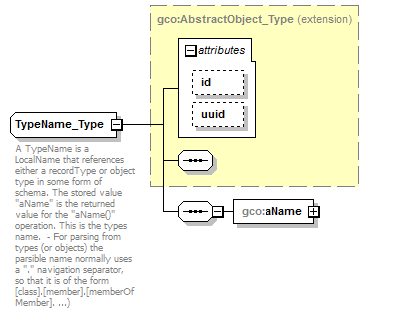| diagram |  |
||||||||||||||||||
| namespace | http://www.isotc211.org/2005/gco | ||||||||||||||||||
| type | extension of gco:AbstractObject_Type | ||||||||||||||||||
| properties |
|
||||||||||||||||||
| children | gco:aName | ||||||||||||||||||
| used by |
|
||||||||||||||||||
| attributes |
|
||||||||||||||||||
| annotation |
|
||||||||||||||||||
| source | <complexType name="TypeName_Type"> <annotation> <documentation>A TypeName is a LocalName that references either a recordType or object type in some form of schema. The stored value "aName" is the returned value for the "aName()" operation. This is the types name. - For parsing from types (or objects) the parsible name normally uses a "." navigation separator, so that it is of the form [class].[member].[memberOfMember]. ...)</documentation> </annotation> <complexContent> <extension base="gco:AbstractObject_Type"> <sequence> <element name="aName" type="gco:CharacterString_PropertyType"/> </sequence> </extension> </complexContent> </complexType> |
element TypeName_Type/aName
| diagram |  |
||||||||||||
| namespace | http://www.isotc211.org/2005/gco | ||||||||||||
| type | gco:CharacterString_PropertyType | ||||||||||||
| properties |
|
||||||||||||
| children | gco:CharacterString | ||||||||||||
| attributes |
|
||||||||||||
| source | <element name="aName" type="gco:CharacterString_PropertyType"/> |
XML Schema documentation generated by XMLSpy Schema Editor http://www.altova.com/xmlspy